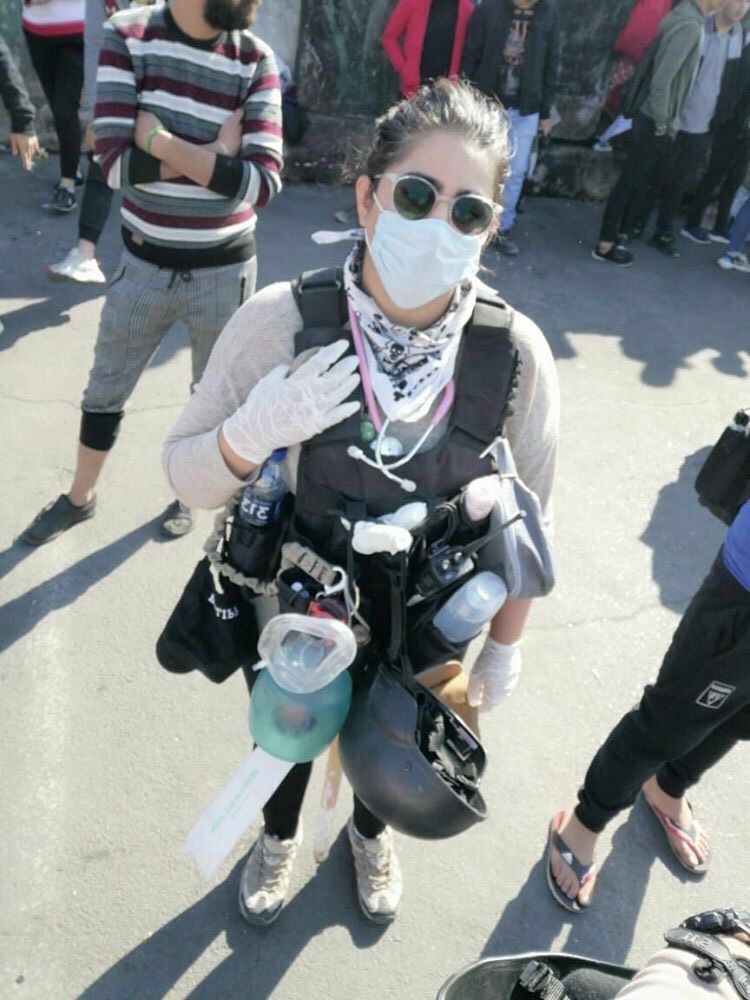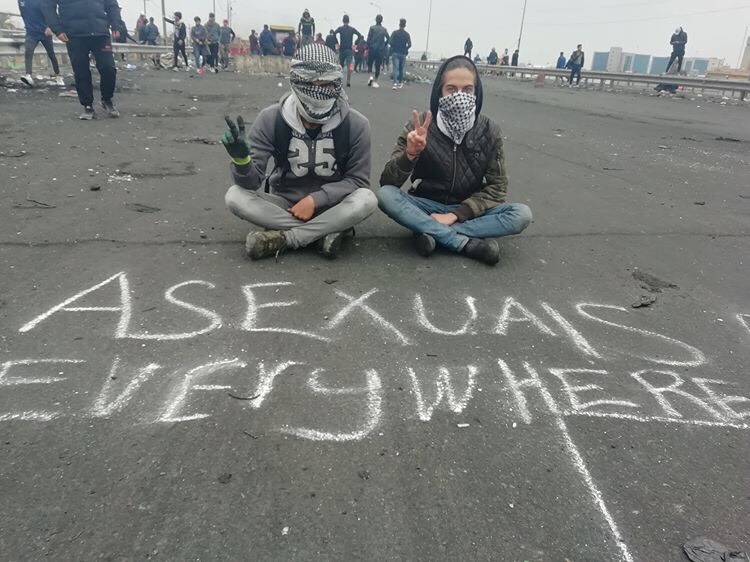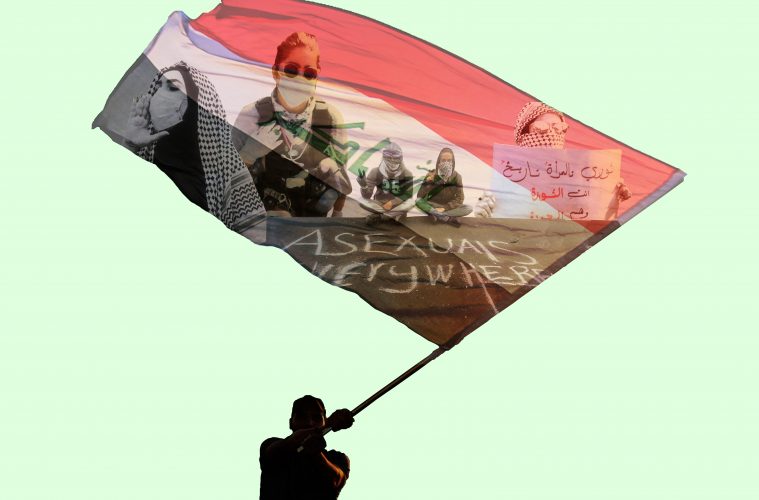Written by Musa Shadeedi
Translated by N.H.
Copy Editor: Eliza Marks
Art work by Yasmine Diaz
In January 2020, Ali el-Husseiny, the spokesperson for the Popular Mobilization Forces (part of the Iraqi armed forces) appeared in military uniform in a video in which he threatened the protestors of the revolution, which began in October 2019, and accused them of being homosexuals (mithliiyn) and prostitutes. Prior to that, Izzat al-Shabandar, a former Iraqi parliamentarian, described the protestors as “thugs and degenerates,” and “Sodomites” (lawata)1 who did drugs, drank alcohol, and fornicated day and night” in a leaked phone call. This wasn’t the first time such claims were made. How did the ruling Iraqi political class incorporate sex into its anti-revolutionary narrative? And how did the protestors respond to these accusations? Did revolutionary spaces really manage to accommodate individuals with diverse sexual orientations and engage all different segments of society despite state narratives?
This article begins the task of documenting the spectrum of sexual orientations present during the Iraqi revolution, the sexual charges leveled by the political class against revolution sites, and how some of these individuals responded to these charges.
The Revolutionary
Lian* is a lesbian dentistry student. She did not participate in the revolution at first because she did not have any hope in the Iraqi society and was not interested in Iraqi political affairs, like many other Iraqis. She had even been planning her future away from Iraq because she did not see a future in it. However, after the first few days of October 2019, she saw young people like her in the squares. “Young people my age who love freedom and want to live in peace. I felt a sense of belonging with them. For the first time in my life, I felt safe with these people. I was one of them and was ready to give my life to them, because we had all become one. I wanted freedom for myself and for them. I wanted the community I saw at Al-Tahrir Square to grow and become a reality for all of us.” That’s when Lian decided she was going to stay in Iraq and participate in building a nation that she wanted and to change reality alongside the revolutionaries at the square. “Of course, it’s not easy, but everything begins at some point and that needs to be now. If not us, then who?”
I could relate to Lian. I also felt the same way during the first weeks of the revolution, even though I live abroad, and this is perhaps the greatest thing the revolution has done for us: It has reformulated our identity.
The deep bonds and solidarity forged in the square took Lian by surprise. People were ready to sacrifice themselves for one another. “One time I walked toward a dangerous area near Jumhuriya Bridge—where security forces’ threw smoke bombs and shot live bullets that killed the protestors—and a poor-looking guy who looked like he was in his early thirties or late twenties took off his helmet and handed it to me. ‘This is for you. Stay safe,’ he said. ‘But I’m not staying here,’ I told him. But he gave it to me and left.” He gave her the only thing that could protect him from death.
She went to the square multiple times with her partner. She told me about the queer people there and their courage in the face of security forces. She did not believe that the participation of queer people in the revolution would weaken it: “They are Iraqis first. The people at the square don’t care if you’re gay or not. The only important thing is honoring the martyrs and avenging their deaths. That’s the most sacred thing, and it strengthens the revolution. It also reveals a lot. Despite being different and afraid of not being accepted in the square, queer people have forgotten their personal fears and are participating in the revolution for a greater cause.”2

Noor as a paramedic in the protests
The Paramedic
Noor is a 23-year-old asexual paramedic from the Al-Tahrir Square in Baghdad. She had previously volunteered in the Iraqi army during the liberation of the country from ISIS. She followed with sadness the events of October 2019, when the Iraqi government used excessive force against peaceful youth demonstrations, and more than 100 people died in under one week. Noor joined the demonstrations on the 25th of that same month, which later became known as the October Revolution. “I started to prepare for the revolution starting the 22nd. We told our friends to join us and bring along first aid kits.” Noor and I talked about female participation in the revolution. She described it as “unexpected and a shock to society, especially that they were at the frontlines and out till late at night.” This irked the government to a great degree and resulted in the systematic kidnapping of paramedics from Al-Tahrir Square. “Yesterday, the government filed a lawsuit against the Organization of Iraqi Women’s Freedom, which protects abused women and provides them with shelter,” Noor said. According to the media, the organization stood in the way of tribal honor killings, which prompted the Secretariat of the Council of Ministers to file this lawsuit against them. This meant that the government benefited from these murders, especially when the victims were protestors.
She told me about a lesbian friend who was protesting. Her friend received death threats from an Irani militia on the pretext that “she resembled a man,” which led to her escaping abroad. On the presence of queer people in the square, she told me there were many of them, and none of them were harassed inside the square, and that “only political parties and their militias did any harassing.” Perhaps this reveals who killed Iraqi people on charges of “homosexuality” over the past 16 years. Regarding the sexual charges leveled against the protestors by the ruling political class loyal to Iran, Noor said, “It’s because they’re sexually repressed. All they think about is sex, which is a natural right. All these attempts to disperse the revolution are unsuccessful because the demands are clear, and there is no going back. Queer people are a source of strength for the revolution.”
The Wounded
Haitham* is a 20-year-old gay medical student. He joined the protests with his friends on the 25th of October. “It was a nice feeling. We were all in it together. There were a lot of queer people, but no one was open about their sexuality. There were a lot of effeminate boys, but no one hurt them. On the contrary, everyone was welcome at the protests.” When I asked him to share a moment he would never forget, he said, “I’ll never forget seeing a smoke bomb hit and kill a person standing in front of me at the same time a smoke bomb hit one of my legs. I passed out and was taken to the hospital.” We made sure he was in good health during this interview.3
One of the most important achievements of the revolution is that it dissolved differences in class, sects, gender, and sexuality. Rich and poor were in it together, Sunni and Shiite chanted side by side, women with men, and not a single reported case of sexual harassment over the entire course of the protests, according to the The Iraqi High Commission for Human Rights, despite the participation of thousands of women. No effeminate men were subjected to any violence in the squares either. This angered the state. It used all possible forms of repression: spraying boiling hot water, physical violence, arrests, kidnapping, threats, torture, live ammunition, poisonous gases, and throwing (expired) tear gas bombs, fatally targeting the heads of protestors. After all these different methods failed to suppress the revolution, the state resorted to sexual accusations. If anything, this showed how desperate the state was.
For years, Arab regimes have benefited from political opposition to homosexuality. It is one of their most important and most utilized tools to attack their opponents.
Historical background
States accusing political opponents of sexual misconduct, homosexuality specifically, is not new. In The Shell, a novel by Syrian writer Mostafa Khalifa, documents what he witnessed in Tadmor Prison after his arrest by the Syrian Ba’athi regime, and how the police accused Muslim Brotherhood prisoners who opposed the state of “sexual deviance” (shithwth jinsi). “I’m almost certain that what the police accused them of is pure fabrication. Even realistically, this is impossible,” he wrote.4
Ironically, five years after the publication of this novel, the media personality and politician Tawfik Okasha, who supports the military regime in Egypt, reiterated the same accusations on air by accusing Muslim Brotherhood prisoners of engaging in “unnatural” sexual relations inside prisons.
Egyptian novelist and journalist Saad el-Qersh also shared the testimony of a state thug who attacked protestors in Egypt in 2011, in what later became known as the “Battle of the Camel.” He said that high-ranking members of the National Party were behind the raid in an attempt to rid Al-Tahrir Sqare of “Hashish-smoking addicts,” who engage in “group sex and sexual deviance.”
Accusations like these are pervasive. The Lebanese journalist Joseph Abou Fadel accused the Lebanese revolution, of aiming for “the acceptance of sodomy and sex changes” and legalizing gay marriage in Lebanon. The director Charbel Khalil also accused the movement of aiming to legalize gay marriage in Lebanon. Algerian Minister of Interior Defense Salah Eddine Dahmoune described Algerian protestors as “deviants (shawath) and homosexuals (mithliyn).”
For years, Arab regimes have benefited from political opposition to homosexuality. It is one of their most important and most utilized tools to attack their opponents. The spokesperson for the Popular Mobilization Forces did not come up with anything new, but was simply reiterating what had been said before. Dividing people into rich and poor, men and women, gay and straight, and creating schisms between them, reinforces the ruling power’s control. It works in its favor. Has the Iraqi state succeeded in doing this?

Photo taken on the highway Muhammad al-Qasim street, where protests took place. Written on the ground, “Asexuals are everywhere”.
The Kidnapped
Accusations of a sexual nature usually decrease the number of protestors, which is why Muqtada al-Sadr, the religio-political leader known for founding the first armed sectarian militia in the history of Iraq, issued a statement on February 8th, 2020, prohibiting the mixing of genders at protest sites, among other things. This came despite the presence of visitation tents for the sacred Shiite ritual of Arba’een, and the parliament, in which Al-Sadr is represented, being mixed-gender. Protestors understood this as an order to abandon protest sites, provoking them further.
In response, a million woman march was held on Thursday, the 13th of February, 2020. Among the chants heard and written at this march were: “Separating religion from the state is much better than separating men from women,” “Religious men don’t represent us,” “The greatest religious ritual is al-hajj, which is mixed-gender,” and “If Zainab hadn’t been with Al-Hussein, who would have led the Battle of Islah after him? The revolution is complete with us.” Pictures of the female martyrs of the revolution were present, and also a satirical online campaign that showed pictures of male protestors wearing the hijab.
On this day, Abdallah* was on the road that connected Al-Khilani Square, which is where there were clashes between security forces and the protestors, and Al-Tahrir Square, where there has been a sit-in since last October. Abdallah was trying to administer first aid to the wounded. He saw a man returning to Al-Tahrir Square whose head was bleeding. “I went over to clean his wound. As I was doing that, two riot control officers appeared. One of them hit me over the head, and I fell to the ground. I tried to stand up, but the other officer hit me and I fell again. Around 10-15 gathered around me and dragged me to Al-Khilani Square.” Abdallah showed me the scratches and the skinned parts of his body that resulted from being dragged. They accused him of throwing stones and Molotov cocktails at them. When he refused to admit to the fabricated charges, they hit him with batons and shoes, and they blindfolded him then proceeded to punch and slap him. He remained kidnapped from 12 pm to 11:00 pm.
Abdallah, who is 18 years old, had been at the protests since October 27th. He distributed tissues to protestors who were affected by tear gas, then he took to spraying a combination of yeast and Pepsi to decrease the effects of the tear gas. He went to the other side of the Jumhuriya Bridge that separated the protestors from the Green Zone, where the political class was. Protestors prevented him standing at the barrier because he was a student, which they knew from his uniform. He returned to the Freedom Monument and protested there. He ran around catching falling smoke bombs with a blanket, so they wouldn’t start spreading smoke. It was there that he witnessed the martyrdom of the revolution’s icon, Safaa al-Sarai, a moment he said that he would never forget.
Security forces wanted him to confess to being raped by protestors at Al-Tahrir Square. “Whenever I denied it, the physical and verbal violence increased. ‘Are you a farkh?5 How many times did they [the protesters] fuck you?’ they asked me.” They insulted his mother and sister, and after checking his phone, accused him of having sex with a girl (a fellow protestor) he had taken a picture with. They also tried to get him to confess that this same girl engaged in group sex in the sit-in tents. In the end, he gave up and told them that he was asexual, and that he didn’t have sex with either men or women. “Do you mean you’re a eunuch?”6 one of the interrogators asked him. The religious entity, the Marja’, had emphasized to security forces the importance of protecting the protestors, so to which religion did these officers belong to? And what is religion’s stance toward them, according to the Marja’?
The illegal kidnapping of paramedics, their torture by state security forces, and for the “informal interrogation” to focus to that extent on sex, are proof of the moral bankruptcy and illegitimacy of this system. They’re looking for any confession that might help political powers to delegitimize the revolution and the people’s support of it.
Al-Sadr Supporter
The same day that Abdallah was kidnapped, Muqtada Al-Sadr issued a second statement condemning the “moral decay” present at protest sites. He accused some of the protestors of being “sexual deviants and homosexuals” and “liberal extremist deviants,” even though this contradicted a fatwa he issued in 2016 defending gay people and ordering people to not assault them. International human rights organizations celebrated back then, but that day, his followers allegedly set a rainbow flag on fire near the Freedom Monument in Al-Tahrir Square.
At the beginning of the revolution, I interviewed a bisexual man who belonged to the Sadrist movement. His name was Hussein. He was from Najaf in the south of Iraq. He was 22 years old. “Leader Muqtada is the first one to call for protests for the sake of the nation in 2017, which took place in Al-Tahrir Square in Baghdad.” Regarding his sexual practices, he said, “If the government was good, our situation would have been better. Our country is bountiful. Every aspect of our lives would have been better.” He told me about a scene that left an impact on him and that he could never forget: “It was when the protestors raised a picture of Imam Ali in front of a riot in Najaf. It was a magnificent sight. The protestors went all the way to the governorate council on the same day, and they camped there.”7
I went back and talked with Hussein again after Al-Sadr’s relationship with the revolution changed. He said that he still supported the revolution and believed that Al-Sadr was trying to save it from the spreading corruption, wickedness, and vice. “One trustworthy source told me that they found a child that had been raped, and the child’s rapists were protestors.”8
This is very similar to what security forces tried to force Abdallah to confess under torture. Was this just a coincidence, and was it possible that the same person who had tortured Abdallah had told Hussein this story? What is more important, however, is that Hussein still believes that the revolution is Iraqi and that he supports it.
We should not expect those with different sexual orientations to adopt the same political ideologies. Some of them are part of the corrupt political class, some stand among the militias and the security forces and kidnap and torture protestors, and some have given their lives for the sake of Iraq. And, there are many who support Muqtada al-Sadr, who criticized the presence of queer people at protest sites. But the most important thing is what the heroes of the protest sites have done despite all their differences, uniting in the face of corruption and sectarianism. This is what the government of 16 years failed to do, instead dividing up the people into a thousand segments, sects, groups, and parties.
*Note: Some of the names in this article have been changed to ensure the safety of those individuals.

